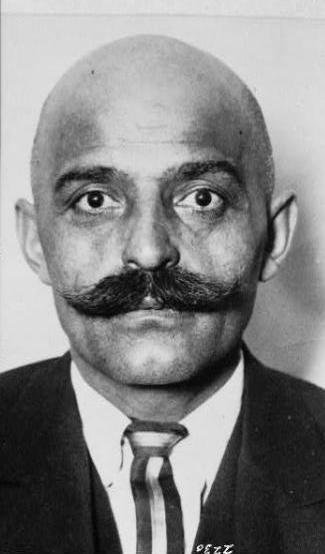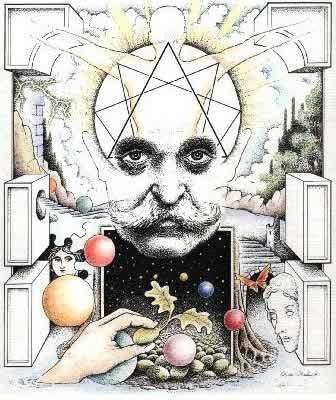George Ivanovich Gurdjieff Born in Aleksándropol currently known as Guiumri in present-day Armenia, it is presumed that his date of birth was on January 14, 1866 although biographers have not agreed with this fact. His mother was Armenian and his father, a shepherd and carpenter of Greek origin.

He was a mystic teacher, writer, Armenian and polyglot composer (he spoke Russian, Turkish, Greek and Armenian), he made a trip to Asia, where he met several people with whom he forms a group called The Seekers of Truth.
With a keen critical sense, a high traditional culture, a mysterious and charismatic personality, he captured the attention of many to guide them towards a possible spiritual and humanitarian evolution. His main work was to make known and transmit the teachings of the Fourth Way in the Western world, like the Russian Piotr Demiánovich Ouspenski. (In another post I will delve into the doctrine of the Fourth Way just follow me)
In 1912 he arrived in Moscow after spending more than 20 years traveling, and began to gather a group of students to immediately establish the Institute for the Harmonious Development of Man.

In 1914, Glimpses of Truth appears, the first (anonymous) sketch of Gurdjieff's thought (under his supervision).
In 1915 he met Piotr Ouspenski, who later became the main disseminator of the Fourth Way in the West (USA, and Europe)
A few years after the foundation of the institute the group of students moved due to the Russian Revolution. In 1917 he traveled to Essentukí and a second foundation of the Institute is produced. Then, in 1919, the group leaves the city in direction to the city of Tbilisi, where a third foundation of the Institute is produced. Later due to political problems they had to leave for Constantinople, after a time they separated and the group traveled to Berlin, London and finally settled in Paris.

In 1922, they bought the mansion Château du Prieuré (Fontaine Blue) in the city Fontainebleau, they conditioned the construction to carry out their practices (they implement a gym and a theater) and the house of studies (Study House) appeared. They are the philosophers of the forest.
At the end of 1923 the sacred movements and dances with the name of "The Wrestling of the Magi" were publicly premiered at the Théâtre des Champs-Élysées , which were practiced in the house and successfully impressed the public.

In 1949, he had already arranged the publication of the First Series (Tales of Beelzebub to his Grandson) in London and New York. Unfortunately, he died on October 29 of that year in the hospital, in Fontainebleau, and is buried with his mother and his wife. Through the publication of self-made books, the Ouspenski and Gurdjieff students continued to spread the teachings of their teachers.
In Latin America there are several schools that follow the Etievan method, based on information from Gurdjieff. This information is aimed at training children and young people their conscience, leading them to "love their work, to strive, to know themselves, to develop their will, to take responsibility for their actions, assuming the consequences of these, to express their feelings, to seek the truth within your being, to focus your attention and to form your conscience, for each day to be better and to be able to face the vicissitudes of life in a positive way ".
In the early 70s, there was a Gurdjieff school on the Caribbean island of Carriacou that functioned as a farm and monastery, following the spiritual precepts of Gurdjieff. But it was destroyed by the intervention of the communist government of Cuba after the 1977 revolution.
Follow me in future post about Gurdjieff and the fourth way
Gurdjieff was certainly an interesting character, although his writing is impenetrable. Ouspensky is easier to read and writes a lot about Gurdjieffs methods. From my experience there is a cult like following of the principles though when in reality there is no single truth. You find your own truth. There are a lot of shady characters out there who profess to be Gurdjieff followers.
I'm agree with you, his writing is impenetrable. But, it is interesting and both (Gurdjieff and Ouspensky) are the most outstanding for the dissemination of the Fourth Way in the West, and the fact of spending years traveling and taking the best points of each culture known to them and thus form a new doctrine is admirable
In Search of the Miraculous by Ouspensky is an excellent work. When reading about the fourth way you need to be mindful that it is also necessary to function in the real world too though. It can take you on a surreal journey and it becomes easy to detach yourself from reality. With such thought provoking ideas it is hardly surprising. My advice would be to read, learn but keep an open mind and keep one foot on the ground ;)
Gurdjieff advocated things like working so hard you literally dropped from exhaustion. I am not sure that was a good thing. However, his followers played a big role in bringing Subud into the West, and that was good.
It is true what you say, everything must be done without excesses. However, I like it the Etievan method, based on information from Gurdjieff, "love their work, to strive, to know themselves, to develop their will, to take responsibility for their actions, assuming the consequences of these, to express their feelings, to seek the truth within your being, to focus your attention and to form your conscience, for each day to be better and to be able to face the vicissitudes of life in a positive way ".